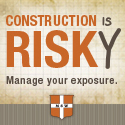Five Fire Prevention Tips at Work
 Print this Article | Send to Colleague Print this Article | Send to Colleague
BY F. MARIE ATHEY
Sparks fly, combustibles
go boom, and workers flee the scene with smoldering clothing or materials. This
sounds like the perfect script for a Halloween movie. Only it is all too real
of a possibility when you are working on construction sites with dangerous
chemicals, faulty wiring or haphazard fire safety training. No wants to be
caught on fire when trying to earn a living at a construction site. Here are five ways to prevent fires at work:
HAVE FIREFIGHTING EQUIPMENT AVAILABLE
The National Institute
for Occupational Safety and Health (NIOSH), through theCDC,has compiled a list of fire prevention
measures for construction work. One of the first requirements is to have
firefighting gear on hand. You should have firefighting equipment (i.e., fire
extinguishers and water drums, less than 100 feet away from the jobsite). These
items should be easily identifiable and regularly checked for damage or water
loss. These items will help you to prevent sparks from spreading into fire
walls.
KEEP IT CLEAN
The
last thing contractors want to do when working on a construction site is to clean up
the place. However, layers of
combustible dust, mountains of dry wood, and cans of half-used paint are ideal
snacks for a greedy fire. Sweep up, straighten up, and don’t stop there. Keep
the weeds and grass at bay, so they don’t help any fire to spread around the
site.
HEATING UP
As the warm weather
flees the scene, you can bet that your workers will want to have a heater or
two on the worksite. Herein lies the hazard. Heating devices might keep your
workers from getting frosty, but they are also a great danger in terms of fire
safety. Choose devices that are made for construction sites, which include
non-toppling units with safety shields, to protect workers from brushing up and
burning their clothing.
SAY "NO" TO FIRES
Never have an open
fire on a worksite. Make the worksite a no smoking zone—free of matches and
lighters. By not bringing open flames into your workplace, you are helping to
enhance the fire prevention abilities of your workers. This also means no
burning of construction materials, trash or other items on the worksite. Most
cities and states have fire ordinances that prevent this as well, so make sure
not to break the law.
ZAP OUT ELECTRICAL HAZARDS
Electrically grounded
fire hazards cannot be taken lightly. Sparks can fly, with electricity zipping
through the bodies of your workers in seconds, and may lead to explosions that
catch everything on fire. Don’t wait for the worst to happen—arm your crew with
knowledge through NFPA 70E training. Define and highlight the Electrical Safety
Standard with some professional training.\
Source: http://www.cdc.gov/HomeandRecreationalSafety/Fire-Prevention/.
F. Marie Athey has been with OSHAcampus.com since 2012 as the company's occupational health and safety technologist. She earned her degree in Environmental Health and Safety Technology from the Texas State Technical College. Marie has more than 15 years of industry experience in occupational health and safety having worked for various U.S. companies in construction and general practice.
   
|

 2300 Wilson Boulevard, Suite 300 · Arlington, VA 22201 · 703-548-3118 (phone) · 703-548-3119 (fax) · www.agc.org
2300 Wilson Boulevard, Suite 300 · Arlington, VA 22201 · 703-548-3118 (phone) · 703-548-3119 (fax) · www.agc.org

